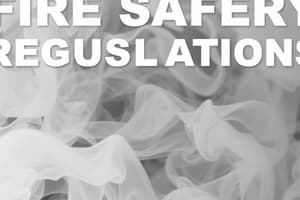Podcast
Questions and Answers
What was the cause of the Station nightclub fire in Rhode Island in 2003?
What was the cause of the Station nightclub fire in Rhode Island in 2003?
- Cooking and heating equipment
- Highly flammable insulation material and a crowded environment (correct)
- Intentional action
- Lack of sprinkler systems
What is the recommended solution to diminish the potential loss of life and property in convention centers?
What is the recommended solution to diminish the potential loss of life and property in convention centers?
- Pre-incident planning and contingency plans (correct)
- Regular fire drills
- None of the above
- Electronic locking systems
What is the definition of an educational occupancy according to NFPA 101?
What is the definition of an educational occupancy according to NFPA 101?
- A place used for educational purposes for 10 or more people for 2 or more hours per day or more than 10 hours per week
- A place used for educational purposes for 8 or more people for 3 or more hours per day or more than 8 hours per week
- A place used for educational purposes for 5 or more people for 5 or more hours per day or more than 15 hours per week
- A place used for educational purposes for 6 or more people for 4 or more hours per day or more than 12 hours per week (correct)
What is the occupant load factor for elementary and high school classrooms?
What is the occupant load factor for elementary and high school classrooms?
What were the three leading causes of school building fires according to FEMA's study?
What were the three leading causes of school building fires according to FEMA's study?
Which type of schools have had the most tragic fires involving educational occupancies?
Which type of schools have had the most tragic fires involving educational occupancies?
What is the potential threat in any place that attracts large crowds?
What is the potential threat in any place that attracts large crowds?
What is the purpose of holding fire drills on a regular basis in elementary and high schools?
What is the purpose of holding fire drills on a regular basis in elementary and high schools?
What is the similarity between college classrooms and educational occupancies?
What is the similarity between college classrooms and educational occupancies?
What is the potential danger in live performances held in large arenas, stadiums, or outdoors using temporary stages and seating?
What is the potential danger in live performances held in large arenas, stadiums, or outdoors using temporary stages and seating?
Study Notes
- Sports arenas, convention centers, theaters, and movie theaters all pose significant fire hazards due to large crowds and potential combustible materials.
- The 1985 Bradford stadium fire in England resulted in 56 deaths and 300 injuries.
- The Station nightclub fire in Rhode Island in 2003 resulted in 100 civilian deaths due to highly flammable insulation material and a crowded environment.
- Sprinkler systems greatly diminish the potential loss of life and property in convention centers, but event organizers may be reluctant to cancel events when the system is not operating.
- Large, complex structures like convention centers require pre-incident planning and contingency plans for locating fires and directing evacuation.
- Theaters built during the first half of the 20th century pose significant fire hazards, but modern movie theaters are typically housed in large buildings with multiple, smaller theaters.
- Live performances are increasingly being held in large arenas, stadiums, or outdoors using temporary stages and seating.
- Firefighters must be prepared to combat large fires combined with extraordinary rescue operations in these occupancies.
- Tactical considerations for protecting egress routes are similar for all of these occupancies.
- Terrorist attacks are also a potential threat in any place that attracts large crowds.
- NFPA 101 defines educational occupancy as a place used for educational purposes for 6 or more people for 4 or more hours per day or more than 12 hours per week.
- College classrooms are not considered educational occupancies, but they have similarities in terms of life safety, extinguishment, and property conservation.
- The occupant load factor for elementary and high school classrooms is 20 net ft2/person.
- FEMA conducted a study of school fires and found that there were around 4000 school building fires reported each year, causing an estimated $66.1 million in property loss and 75 injuries.
- The three leading causes of school building fires were cooking, intentional action, and heating.
- Most tragic fires involving educational occupancies occurred in primary or elementary schools.
- Younger children are less likely to take appropriate action during a fire, making them more vulnerable.
- Teachers are natural role models that children follow in an emergency.
- Fire drills held on a regular basis in elementary and high schools increase awareness and better establish teacher-to-student leadership.
- Security measures, such as electronic locking systems, have improved in recent years due to multiple “active shooter” incidents.
Studying That Suits You
Use AI to generate personalized quizzes and flashcards to suit your learning preferences.
Description
Are you familiar with fire safety in large venues like sports arenas, convention centers, and theaters? Test your knowledge with this quiz! Learn about the potential hazards and necessary precautions for these occupancies, as well as educational occupancies like schools and classrooms. From sprinkler systems to evacuation plans, this quiz covers essential information for anyone interested in fire safety. Don't miss the chance to increase your understanding of fire safety in crowded public spaces and educational environments.




